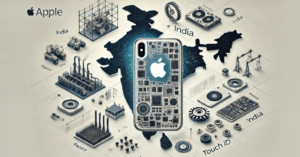Apple Expands Supplier Network in India and Patents New iPhone Case with Touch ID and Capacitive Buttons
Apple is expanding its supplier network in India, negotiating with Wipro Enterprises and Lakshmi Machine Works (LMW) to supply parts for its supply chain. This move aims to reduce risks and strengthen its presence in India amid political uncertainty. Apple is already working with companies like Tata Group, Motherson Group, Aequs, and Bharat Forge.
Wipro is involved in engineering services, while LMW specializes in textile machinery and aerospace components. Apple’s partnerships with local suppliers are part of its strategy to reduce costs, improve efficiency, and contribute to India’s electronics manufacturing push.
Additionally, Apple has patented a new iPhone case that could feature Touch ID and capacitive buttons. The case would allow biometric security while improving button tactility and offering a touch sensor for enhanced user experience. This innovation could bring intuitive interaction without physically pressing buttons.

Apple Expands Supplier Network in India and Patents New iPhone Case with Touch ID and Capacitive Buttons
Apple is planning to expand its supplier network in India and is currently in discussions with Wipro Enterprises and Lakshmi Machine Works (LMW), according to sources. The tech giant has already partnered with or is in talks with several Indian companies, including Tata Group, Motherson Group, Aequs, and Bharat Forge. This move is part of Apple’s strategy to reduce risks and strengthen its presence in India, especially amid global uncertainties like changing policies during the Trump administration.
Wipro Enterprises, known for its expertise in engineering services such as hydraulics, water treatment, and aerospace, also has a consumer division that focuses on personal care, home care, and lighting products. On the other hand, LMW, based in Coimbatore, specializes in textile machinery, CNC machines, and aerospace components. Apple is reportedly in advanced talks with Wipro and early-stage discussions with LMW to supply parts for its supply chain.
Experts believe that Apple’s decision to collaborate with local suppliers like Wipro and LMW is a smart move. It helps the company reduce supply chain risks, cut costs, and improve efficiency. Apple has been actively supporting India’s push to boost electronics manufacturing, contributing to increased exports and production in the country. By partnering with more Indian manufacturers, Apple is demonstrating its long-term commitment to India, which is becoming a key part of its global supply chain.
Earlier, Apple was also in talks with Bharat Forge, a Pune-based company, to supply mechanical parts. If this partnership materializes, it will further strengthen Apple’s local network in India.
In other news, Apple is reportedly working on a new iPhone case that could feature Touch ID and capacitive buttons, according to a recently discovered patent. This aligns with rumors suggesting that the upcoming iPhone 16 might include a capacitive Capture Button. The case would allow Touch ID signals to be transmitted to an iPhone button, providing users with a secure and convenient way to unlock their devices while maintaining biometric security.
The case could include capacitive buttons that detect touch and gestures without interfering with the phone’s functionality. While it’s still unclear whether this concept will become a real product, the patent highlights Apple’s continuous efforts to innovate in the field of iPhone accessories.
Some of the key features of this potential case include:
- Improved Button Feel: The case would minimize air gaps between the case and the phone’s buttons, making them feel more responsive and tactile when pressed.
- Touch Sensor Integration: The case could come with a built-in touch sensor, allowing users to interact with their device without physically pressing buttons.
- Enhanced User Experience: The sensor could detect various inputs like pressure, location, and even fingerprints, offering a more intuitive and secure way to use the phone.
The patent also includes detailed diagrams showing how the case would work with the device. These diagrams provide close-ups of the buttons, sensors, and different touch inputs, giving a clearer picture of how the technology would function.
Overall, Apple’s efforts to expand its supplier network in India and innovate with new accessories like the Touch ID case demonstrate the company’s commitment to improving its products and strengthening its global supply chain. By working with local suppliers and exploring new technologies, Apple is positioning itself for long-term growth and success in one of the world’s fastest-growing markets.
You must be logged in to post a comment.